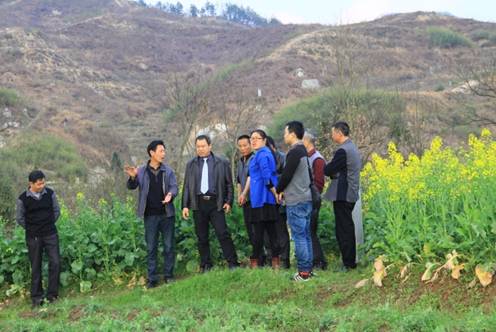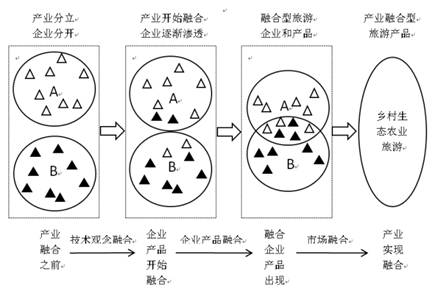Deng Aimin, Zhang Lan
Most of poor population of
Having had repeated field visits to the mountains and rivers in Maishi town Tongcheng County from March 2016, the planning group has an in-depth understanding of the local tourism resources and the local residents living conditions, and has found that most of the local poor residents are engaged in manual work. Owning to strive to develop rural tourism,

1. The necessity of combining eco-agriculture with Tourism Industry during the process of poverty alleviation
Coming from the integrative development of eco-agriculture and tourism industry, the eco-agricultural tourism is a tourism form that composes of agricultural resources, agricultural production methods, rural characteristic folk customs, rural architecture and rural characteristic handicrafts gradually being people’s sentiments for the nature. It is the integration of the primary industry and the tertiary industry, thus the farmers can transform from the produce-oriented of the primary industry to the service-oriented of the tertiary industry, and gradually form a benign interaction mechanism with agriculture to support tourism and tourism to promote agriculture. Mainly based on traditional agriculture, Maishi town has well-developed characteristic agriculture such as honeysuckle, rape and grapes, but the income source of the farmers doesn’t have obvious changes and the problem of poverty has not been effectively and entirely solved. By putting on tourism coat to ecological agriculture, we can add value of agricultural products in culture and natural atmosphere, ensure agricultural products both in quality and safety, shorten the circulation of agricultural products, promote the employment of farmers, increase the value-added functions of agriculture, and then, we will make up the unreasonable industrial structure of Maishi town, facilitate the structural adjustment of poverty-stricken areas, and change the status quo of the poor, uneven foundation in economic development. We should make full use of local agricultural tourism resources and build a distinctive agricultural tourism industry to promote the development and utilization of rural resources and agricultural processing projects accelerate economic upgrading. The integrated development of eco-agriculture and tourism industry, on the one hand, can help farmers’ agricultural products to directly sale by tourism, on the other hand, can promote the labor intensive industries such as service industry, agricultural products processing industry and villages and towns small industries in order to realize the in-place transformation of surplus rural labor force, continuously drive the increase in per capita income of farmers and accelerate the process of poverty reduction in Maishi town.
2. The feasibility of the combination of eco-agriculture and tourism industry in Maishi town
The natural mineral water “Huangci” of Qili mountain sells well in border trade market of Hunan, Hubei and Jiangxi provinces; the 100-year products factory in Maishi town has deeply developed; the dairy industry is beginning; the proportion of cash crops accounts for more than 80% of agriculture, and Huanglong Mountain rich tourism resources, which lay a solid foundation for the local tourism. According to the plan of poverty alleviation, the paper “the classification, investigation and evaluation of tourism resources” (GB / T18972-2003) analyzes the types of tourism resources as following: The tourism resource of the town covers 87.5% of the 8 main categories, namely, the culture, water, biology, weather and climate, site and relic, architecture and establishment and tourism commodity. There are 14 subspecies, accounting for 45.2% of the total number; there are 18 basic types, accounting for 11.6% of the total number of basic types. In the survey, we find that agricultural tourism resources in poor rural areas occupy the vast majority of the basic types of tourism resources. Obviously, the combination of ecological agriculture and tourism industry has a good resource advantage in Maishi town. It can be seen that the resource advantage of Maishi town is one of the important reasons for the integrative development of ecological agriculture and tourism industry.
3. The process of the integrative development of ecological agriculture and tourism industry in
With the continuous openness between the industries, and acquiring the breakthroughs such as industrial organization innovation, industrial control relaxation, industrial management reform, the combination of tourism industry and ecological agriculture appears in Maishi town
(See figure 1: A: Maishi town tourism industry; B: ecological agriculture; white triangle is on behalf of Maishi town tourism products; black triangle is on behalf of eco-agricultural products)

A model for the process the combination of eco-agriculture and tourism industry in Maishi town
4. The strategy of industrial integration in poverty alleviation of Maishi town
The contribution rate of ecological agriculture to the tourism industry in
To implement plans, create tourism and agricultural products brand. In accordance with the ideas and designs set out in the overall tourism development plan of Maishi town of Hubei Province , the actual capital situation, and its own resources, we build cultural products series, healthy sports products and healthful resort products series, and then build poverty alleviation brand of the culture, ecology and health as the theme which urban populations are most concerned about. We will vigorously support the local brands of special agricultural products, build brands like bean products, mineral water, bamboo, start the characteristic agriculture products like strawberry, grape, honeysuckle. Meanwhile, through sorting the policies of subsidies, establishing a reasonable distribution mechanism of benefits, holding the mechanism of collective ownership of resources, the local residents will share tourism development results.
To integrate resources, innovate mechanisms and broaden channels. For purpose of the integration of agricultural resources, we will encourage the poor residents to participation in the development of poverty alleviation through eco-agricultural tourism in the forms of cooperation, joint venture, contracting, leasing; By setting up tourism poverty alleviation special funds, focusing on tourism poverty alleviation model households we will conduct mechanism innovation. In accordance with the principle of smoothing channels, the constant in trend, overall arrangement, we will have a “boxing combination” between all sectors of industry funds and agricultural tourism poverty alleviation project. Through poverty identification, differentiated support, dynamic management, we will offer poor households targeted help to improve the accuracy of poverty alleviation, and then change the disadvantage of “hard to support the poor” presenting in the past poverty alleviation project.

